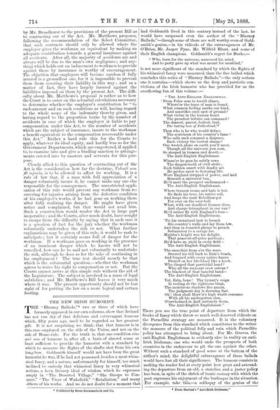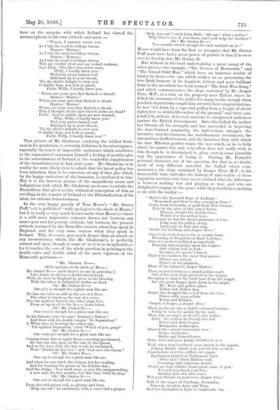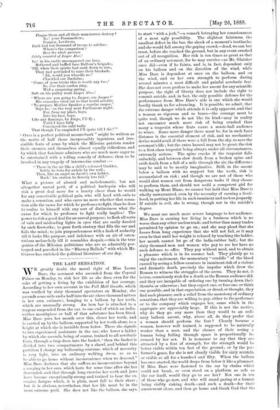THE NEW IRISH HUMORIST.
THE "Blarney Ballads,"* two or three of which have formerly appeared in our own columns, show that Ireland has not run dry of that delicious and extravagant humour which, fifty years ago, used to be regarded as her greatest gift. It is not surprising, we think, that that humour is in this case employed on the side of the Union, and not on the aide of Home-rule. For the truth is, that one condition sine qud non of humour is, after all, a basis of shrewd sense at least sufficient to provide the humorist with a standard by which to measure the flights of the shafts shot from his own long-bow. Goldsmith himself would not have been the great humorist he was, if he had not possessed, besides a most whim- sical fancy, and a nature, unfortunately for himself, too much inclined to embody that whimsical fancy in very whimsical actions, a keen literary ideal of wisdom which he expresses amply in " The Deserted Village," " She Stoops to Con- quer," "The Vicar of Wakefield," "Retaliation," and many others of his works. And we do not doubt for a moment that
• Published by Swan Sonnensehein and Co. • From Harkan's "Anti-Irish Irishman."
had Goldsmith lived in this century instead of the last, he would have surpassed even the author of the " Blarney Ballads,"—though some of them are well worthy even of Gold- smith's genius,—in his ridicule of the extravagances of Mr. O'Brien, Mr. Jasper Pyne, Mr. Wilfrid Blunt, and some of their English champions. Goldsmith's regret for Burke,— "Who, born for the universe, narrowed his mind,
And to party gave up what was meant for mankind,"
is not more significant of the standard by which the flights of his whimsical fancy were measured, than the fine ballad which concludes this series of " Blarney Ballads,"—the only serious one it contains,—which shows us the deep and patriotic con- victions of the Irish humorist who has provided for us the overflowing fun of this volume :— " THE ANTI-ENGLISH ENGLISHMAN.
From Polar seas to torrid climes, Where'er the trace of man is found, What common feeling marks our kind, And sanctifies each spot of ground ? What virtue in the human heart The proudest tribute can command ? The dearest, purest, holiest, best, The lasting love of Fatherland.'* Then who is he who would deface The scutcheon of his country's fame ? Who calls each conquest a disgrace, Each victory the veriest shame ? One wretch alone on earth you'll meet,
Though all the universe you scan, So steeped in treason and deceit,—
The Anti-English Englishman.
Where'er he goes he subtly sows The dragon-teeth of civil strife; Each hidden smart with deadly art He probes anew to festering life.
Were England stripped of power, and laid Beneath a universal ban,
He'd meet the prospect undismayed—
The Anti-English Englishman.
Where treason teems and hate is hot, He finds his true, his native soil, And keeps the rank Rebellion-pot For ever on the over-boil.
What, with our deadliest foemen close,
And charge triumphant in our van ? He'd rather fly with England's foes—
The Anti-English Englishman.
'Tie his unnatural task to breach His country's walls and lay them law, And then in rounded phrase to preach Submission to a savage foe. Majuba's height was his delight,
That peace-at-all-price partisan ; He'd have us yield in every field—
The Anti-English Englishman.
The anarchist from o'er the wave Steered his fell bark to Erin's beach, And leagued with every native knave Preyed on her life-blood like a leech. Who clasped that parricidal hand ?
Who all the recreant crew outran ? The blackest of that baneful band—
The Anti-English Englishman.
Yet, Erin, hope ! Thy tyrant's reign Is reeling at the righteous blast, The monstrous shadows flee amain, The judgment day is dawning fast.
Oh ! then shall Heav'n's high wrath consume With all his misbegotten clan, O'erwhelmed in dark untimely doom, The Anti-English Englishman."
There you see the true point of departure from which the freaks of fancy which throw so much well-deserved ridicule on the Parnellite strategy are measured. It is the voluntary divergence from this standard which constitutes to the writer the measure of the political folly and ruin which Parnellite policy has attempted to bring about. For Mr. Graves, the anti-English Englishman is evidently also in reality an anti- Irish Irishman; one who would undo the prospects of both countries in the endeavour to pit the one against the other. Without such a standard of good sense at the bottom of the author's mind, the delightful extravagance of these ballads would have lost all their significance. The humour consists in making the reader feel at every point how great and astound- ing the departure from an old, a statelier, and a juster policy has been, in spite of the shriek of ironic ecstasy with which the poet expresses his enjoyment of the burlesque in the situation. For example, take this,—a soliloquy of the genius of the hour on the surprise with which Ireland has viewed the metamorphosis in his own attitude and mien
WILLy, I HARDLY KNEW YOU.
As I tuk the road to College Green, Hurroo ! Hurroo !
As I tuk the road to College Green, Hurroo ! Hurroo !
As I tuk the road to College Green, Wid my twirlin' stick and my cocked caubeen, Says Erin, The likes was never seen ; Willy, I hardly knew you!
Wid your green turned coat Buttoned up to your throat, 'Tis the divil's delight to view you.
0 darlin' dear, you look so queer, Faith, Willy, I hardly knew you.
Where are your eyes that flashed so dread ?
Hurroo ! Hurroo !
Where are your eyes that flashed so dread, Hurroo ! Hurroo !
Where are your eyes that flashed so dread, That I thought on the spot they'd strike me dead P Faith ! they're smilin' upon me now instead; Why, Willy, I hardly knew you!
Wid your green turned coat Buttoned up to your throat, 'Tis the divil's delight to view you.
0 darlin' dear, you look so queer, Faith, Willy, I hardly knew you.'"
That picture of Mr. Gladstone outdoing the wildest Irish- man in his patriotism, is certainly delicious in its extravagance, especially the touch of impossible caricature which attributes to the impassioned statesman himself a feeling of positive glee in the astonishment of Ireland at the wonderful completeness of the transformation he had undergone. Mr. Gladstone is in reality far more likely even to admit that his latest policy has been mistaken, than to be conscious of any of that glee which, by the happy caricature of the humorist, is attributed to him. But it is the inwoven picture of the magnificent scorn and indignation with which Mr. Gladstone used once to rebuke the Parnellites, that gives to•this whimsical conception of him as revelling in the wonder• of Ireland at the Hibernification of his mien, its extreme humorousness.
In the very happy parody of Tom Moore's " Mr•. Orator Puff,"—it is published " with apologies to the shade of Moore," but it is really a very much keener satire than Moor•e's,—there is a still more impressive contrast drawn, not between any man's past and his present attitude, but between• the present attitude assumed by the Parnellite orators when they speak in England, and the very same orators when they speak in Ireland. This, of course, goes much deeper than an attack on any inconsistency which, like Mr. Gladstone's, is perfectly earnest and open, though to some of us it is so inexplicable,— for it touches the core of the whole question in pointing to the double voice and double mind of the most vigorous of the Home-rule partisans :—
" Ma. ORATOR D—.
(With apologies to the shade of Moore.)
Mr. Orator D— (now there's no use in guessing !) Like Janus of old has a double-faced head : With one here in England he gives us his blessing, With the other in Ireland he wishes us dead. Oh ! Mr. Orator D— One face is enough for a plain man like me.
He has one voice as soft as the coo of a dove, The other is harsh as the caw of a crow; The one mutters hatred, the other sings love, From so/ up in alt to the D— down below.
Oh! Mr. Orator D—
One voice is enough for a plain man like me.
In his falsetto voice he cries 'Ireland a Nation !'
And then with his double tongue `No Separation!'
A Whig once on hearing the orator say, `I'm against Separation,' cried 'Which of you, pray?'
Oh ! Mr. Orator D—
One country's enough for a plain man like me.
Coming home late at night from a meeting proclaimed, He was run into gaol, at the suit of the Queen, And as the door shut, the last words he exclaimed, Were Gladstone for ever !' and God save the Green !'
Oh ! Mr. Orator D— One cry is enough for a plain man like me.
And when he was tried, the Crimes Act for evading, And for wearing the green on the Jubilee day ;
Said the Judge, 'You shall wear, as you like masquerading, A new suit, for two months, but this time 'twill be gray. Oh! Mr. Orator D— One suit is enough for a poor man like me.
From his cold prison cell, so gloomy and bare, Help me out !' he exclaimed, with a curse and a prayer.
Help you out !' cried John Bull; 'Oh my ! what a pother ! Why there's two of you there, can't you help one another ?' Oh ! Mr. Orator D—
Two months aren't enough for such martyrs as ye !"
Moore would have been the first to recognise that Mr. Orator Puff must have had a great power of growth in him if he were ever to develop into Mr. Orator D.
But without in the least undervaluing a great many of the other pieces,—for example, " The Groves of Hawarden " and "The Grand Ould Man," which have an immense wealth of banter in them,—the one which strikes us as presenting the - true Irish humour in its happiest, richest, and most brilliant form is the one which has been termed " The Irish War-Song," and which commemorates the siege sustained by Mr. Jasper Pyne, M.P., in a ruin on his property near Tallow, where he defied the warrants of the police for many weeks, though when patriotic deputations sought him out with their congratulations, he was " let down by a rope and pulley from a height of about eighty feet to within fifteen feet of the ground," and there, sus- pended in mid-air, delivered orations to enraptured audiences against the British Government. Into this ballad the author has thrown all his strength, and has succeeded in depicting the hare-brained pugnacity, the half-serious swagger, the inventive mischievousness, the melodramatic resentment, the unconscious ineffectiveness, and the harmless fury with which the true Milesian patriot wages the war which, as he is fully aware, he cannot win, and very often does not really wish to win, though he is determined to gloss over in some plausible way the appearance of losing it. Putting Mr. Parnell's personal character• out of the question, for that is, no doubt, made of very different material, the ballad which com- memorates the siege sustained by Jasper Pyne, M.P., in his inaccessible ruin, embodies the history of nine-tenths of those ingenious warriors who have never realised what the difference is between making war and playing at war, and who are delighted to engage in the game, while they would have nothing to do with the reality:— "Hail to the Emerald Hope of Lisfinny ! `Honoured and blest be the evergreen Pyne !'
Gems from Golconda, or gold from New Guinea, Palo by the glow of this jewel divine. Heaven, should his eyelids close, Watch o'er his nether hose, Ne'er may he don the dread garments of blue : Long may his pulley swing, Long may he lurk and sing, Strike for Lisfinny and Jasper Aboo !'
Ours is no clerk from a city or county bank, Blooming at Brighton on Bank holidays ; Ours is a perfect political mountebank Dancing and prancing upon the trapeze.
Safe widout bolt or lock, Scorning the peeler's knock, Higher he clambers the more they pursue. Silence, ye cynical, Pyne's on his pinnacle, Blaze of our binnacle, Jasper Hurroo!
Then, as you'd witness a grand golden eagle Out of his eyrie high perched on the height, Swooping to snatch the swift hare from the beagle, See our great Jasper darts down in his might. Hi ! Kern and gallow glass, Tallow lad, Tallow lass, Jasper has dropped like a bolt from the blue : Pierce with your pinata Kerry and Killaloe, Jasper, a Jasper, a Jasper Aboo !'
There in the air like a child's coloured bladder,
Softly he bobs for awhile by the wall; Then, like an angel on Jacob's own ladder, Hark ! his oration he fiercely lets fall.
Never such fiery tropes, Metaphors, metascopes, Blasted the coward coercionist crew !
Scipio, Sosthenes, Burke and Demosthenes, Pyne, were just poor penny whistles to you.
Well, when they'd printed your speech in the papers, Johnny Bright cursed you, you hit him so hard ; Chamberlain over his codfish cut capers,
Hartington fainted in Parliament Yard. g Seize him!' black Balfour said,
Cowering with conscious dread ; Fetch me that villain's head quick, some of you.'
Yet still you faced your foes, Smiling mid owls and crows, Wid your thumb on your nose, Jasper Aboo !
Talk of the sieges of Carthage, Jerusalem, Nineveh, Ascalon, Acre, and Troy,
Had the blockaders a Pyne to bamboozle 'em, Plague them and all their manoeuvres destroy ? No ! your Psammeticus, Pompey, Leviticus, Each had ten thousand of troops to subdue : Where's the comparison ?
Here the whole garrison Solely consisted of Jasper Aboo Lo! in his castle unconquered our hero, Bothered and baffled base Balfour's brigade ; "Pill, when their spirits had sunk down to zero, They just pertinded to raise their blockade.
` Ah, would you wheedle us ?'
Chuckled our Ikedalus ; Come, of your tricks this is worth any two.' So, o'er their cordon ring, Wid a surprising spring, Safe on his pulley went Jasper Aboo!
Where are you going to, Jasper, our Jasper ?' His comrades cried out to that bould aerolite. To prepare Misther Speaker a regular rasper,' Says he, on the very next Parliament night.
For, from my place, boys, Into his face, boys, Like any flamingo, by Jingo, I'll fly ; Until I have fully Convinced the ould bully That though I'm suspinded I'll spake till I die!' "
Ours is a perfect political mountebank " might be written as the motto of half those inexpressibly ingenious and irre- sistible feats of arms by which the Milesian patriots render their enemies and themselves almost equally ridiculous, and by which they fascinate admirers who are much more eager to be entertained with a telling comedy of defiance, than to be involved in any tragedy of internecine combat :-
" There in the air like a child's coloured bladder, Softly he bobs for awhile by the wall ; Then, like an angel on Jacob's own ladder, Hark ! his oration he fiercely lets fall."
What a picture of absurd and melodramatic, but not ,ltogether unreal peril, of a political harlequin who will risk a great deal more for a hearty cheer than he would for any conceivable political gain, who will herd with owls to make a sensation, and who cares no more whether that sensa- tion aids the cause for which he professes to fight, than he does to realise to himself with any sort of distinctness what the cause for which he professes to fight really implies ! The power to risk a good deal for an unreal purpose; to flash all sorts -of vain and misleading lights in eyes that are easily dazzled by such fireworks ; to pour forth oratory that fills the ear and foils the mind ; to join purposelessness with a dash of audacity till it looks like purpoSe, and indolence with an air of osten- tatious melancholy till it resembles despair,—this is the true genius of the Milesian politicians who are so admirably por- trayed and parodied in the " Blarney Ballads" with which Mr. Graves has enriched the political literature of our day.




































 Previous page
Previous page